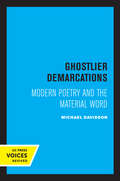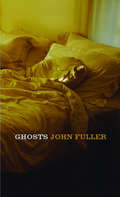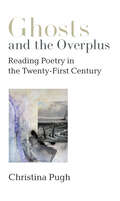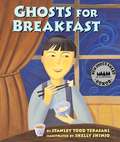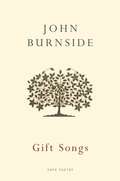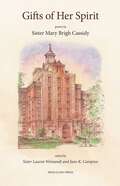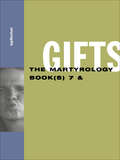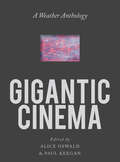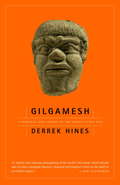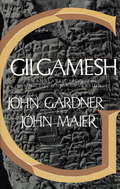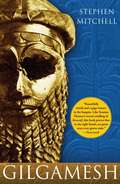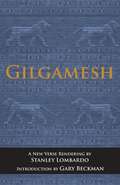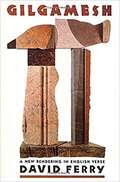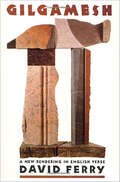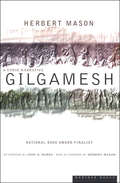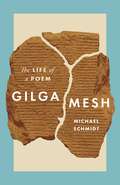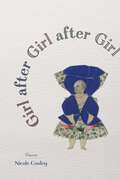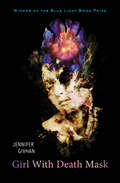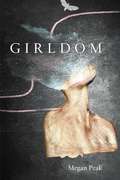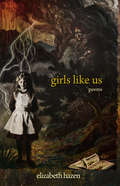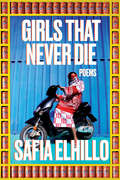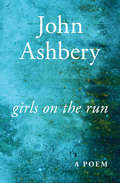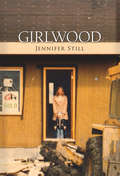- Table View
- List View
Ghostlier Demarcations: Modern Poetry and the Material Word
by Michael DavidsonWhy do modern poets quote from dictionaries in their poems? How has the tape recorder changed the poet's voice? What has shopping to do with Gertrude Stein's aesthetics? These and other questions form the core of Ghostlier Demarcations, a study of modern poetry as a material medium. One of today's most respected critics of twentieth-century poetry and poetics, Michael Davidson argues that literary materiality has been dominated by an ideology of modernism, based on the ideal of the autonomous work of art, which has hindered our ability to read poetry as a socially critical medium. By focusing on writing as a palimpsest involving numerous layers of materiality—from the holograph manuscript to the printed book—Davidson exposes modern poetry's engagement with larger historical forces. The palimpsest that results is less a poem than an arrested stage of writing in whose layers can be discerned ghostly traces of other texts. This title is part of UC Press's Voices Revived program, which commemorates University of California Press’s mission to seek out and cultivate the brightest minds and give them voice, reach, and impact. Drawing on a backlist dating to 1893, Voices Revived makes high-quality, peer-reviewed scholarship accessible once again using print-on-demand technology. This title was originally published in 1997.
Ghosts
by John FullerLike the possible phantoms that stalk the dark passageways of its title poem, John Fuller's beautifully lucid collection explores the grey area between life and death. Full of self-deprecating wit and subtle insight, the poems contemplate the inevitability that, when one reaches a certain age, the moment of one's own passing will start to haunt one.In 'Flea Market' there is the pathos of once-loved objects laid out, meaningless, 'on the cobbles for scavengers'. In 'Positions in the Bed', the restless search for a comfortable way to sleep leads to thoughts of the morning when 'we find/ Ourselves absconded from the body's/ Weary roll-call'. And yet, out of this sense of mortality, grows a determination to take delight in the moment, to appreciate fully 'the business of living'.These poems are not only intimate, domestic and often funny, they are uncompromising in the way they confront the huge and unanswerable questions of life. The movement of thought is rendered beautifully concrete in the intricate music of their langauge, and melancholy co-exists with a lightness of touch that builds a moving and humane barricade against 'life's brevity/ And it's insignificance'.Shortlisted for the Whitbread Award for Poetry.
Ghosts and the Overplus: Reading Poetry in the Twenty-First Century (Poets On Poetry)
by Christina PughGhosts and the Overplus is a celebration of lyric poetry in the twenty-first century and how lyric poetry incorporates the voices of our age as well as the poetic “ghosts” from the past. Acclaimed poet and award-winning teacher Christina Pugh is fascinated by how poems continually look backward into literary history. Her essays find new resonance in poets ranging from Emily Dickinson to Gwendolyn Brooks to the poetry of the present. Some of these essays also consider the way that poetry interacts with the visual arts, dance, and the decision to live life as a nonconformist. This wide-ranging collection showcases the critical discussions around poetry that took place in America over the first two decades of our current millennium. Essay topics include poetic forms continually in migration, such as the sonnet; poetic borrowings across visual art and dance; and the idiosyncrasies of poets who lived their lives against the grain of literary celebrity and trend. What unites all of these essays is a drive to dig more deeply into the poetic word and act: to go beyond surface reading in order to reside longer with poems. In essays both discursive and personal, Pugh shows that poetry asks us to think differently—in a way that gathers feeling into the realm of thought, thereby opening the mysteries that reside in us and in the world around us.
Ghosts for Breakfast
by Stanley Todd Terasaki Zetta Elliott Shelly ShinjoPON! PON! PON! PON!The pounding on the door brings three unexpected guests to our young narrator's home -- Mr. Omi, Mr. Omaye, and Mr. Ono. The Troublesome Triplets, as they are called because they always seem to have some sort of complaint, have just seen ghosts -- dozens of them -- in Farmer Tanaka's field! The ghosts were long and thin and white, very white, and they were dancing in the moonlight.Papa thinks the situation is great fun, but his son isn't so sure. After all, there are ghosts out there. So Papa decides to get to the bottom of the Triplets' story. He sets off to hunt the ghosts, and he takes his son with him. <P><P> Set in California in the 1920s, this delightful father-son story speaks to all young children who yearn to overcome their fears. Readers also come to realize the hazards of jumping to conclusions, for things aren't always what they seem. In 2000, Lee & Low established its annual New Voices Award to encourage writers of color to enter the field of children's literature. Ghosts for Breakfast was one of the honorees that year.
Gift Songs
by John BurnsideTo the Shakers, a good song was a gift; indeed the test of a song's goodness was how much of a gift it was. In their call to 'labour to make the way of God your own', Shaker artists expressed an aesthetic that had much in common with the old Japanese notion, attributed to Hokusai, that to paint bamboo, one had first to become bamboo. In his tenth collection, John Burnside begins with an interrogation of the gift song, treating matters of faith and connection, the community of living creatures and the idea of a free church - where faith is placed, not in dogma or a possible credo, but in the indefinable - and moves on through explorations of time and place, towards a tentative and idiosyncratic re-ligere, the beginnings of a renewal of the connection to, and faith in, an ordered world. The book closes with a series of meditations on place, entitled 'Four Quartets', intended both as a spiritual response to the string quartets of Bartók and Britten (as Eliot's were to Beethoven's late quartets), and as an experiment in the poetic form that the finest of poets, the true miglior fabbro, chose as a medium for his own declaration of faith. The poems in this collection are true gifts: thrillingly beautiful, charged with power and mystery, each imbued with the generous skills of a master of his craft.
Gifts of Her Spirit: Poems
by Mary Brigh CassidyA poignant collection of poems written by a dedicated Franciscan sister and the former hospital administrator of Saint Marys Hospital during a lifetime of dedication, this is a work that celebrates the seasons of life and brings insight—and a smile—to readers everywhere.During her fifty-five-year career at Saint Marys Hospital in Rochester, Minnesota, Sister Mary Brigh Cassidy remained a common person with uncommon capabilities. To whatever position she held, she brought a business acumen that was legendary, though she was quick to dismiss her extraordinary gifts for leadership as ordinary. Even though she worked tirelessly as the hospital administrator, caring for patients and leading the hospital through unparalleled growth, she found time at the end of her busy days to write poetry and reflect on spirituality, nature, and a life dedicated to service. Composed between the years of 1928 and 1968, the poems in Gifts of Her Spirit paint a picture of life through the Great Depression, World War II and post-war events—though, like Emily Dickinson and Jane Austen, Cassidy created her own world of words that was parallel to, but separate from, the great events around her. Her poetry often uses images from nature to capture the beauty and poignancy found in the seasons of the church and in the seasons of life—each with its own purpose, challenges, and rewards. Gifts of Her Spirit is a curation of approximately sixty of Cassidy&’s poems, all arranged according to the Liturgical Calendar of the Catholic Church. From limericks to meditations, they gesture gently to the beauty of nature&’s surroundings, provide strength for life&’s challenges, and encourage the reader to look within themselves and to eternity. For those who knew Cassidy, her life itself was a gift of the Spirit. For those who read these poems, the wonder of that gift is revealed through her words.
Gifts: Martyrology Books 7 and 8
by Bp Nichol'All of Nichol's work is stamped by his desire to create texts that are engaging in themselves as well as in context, and to use indirect structural and textual devices to carry meaning. In The Martyrology different ways of speaking testify to a journey through different ways of being. Language is both the poet's instructor and, through its various permutations, the dominant "image" of the poem. The [nine] books of The Martyrology document a poet's quest for insight into himself and his writing through scrupulous attention to the messages hidden in the morphology of his own speech.' - Frank Davey
Gigantic Cinema: A Weather Anthology
by Alice Oswald & Paul KeeganA luminous, "deliciously playful" (Rishi Dastidar, Guardian) anthology of poems and prose inspired by the weather. In three hundred varied entries, Gigantic Cinema narrates the weather of a single capricious day, from dawn through rain, volcanic ash, nuclear dust, snow, light, fog, noon, eclipse, hurricane, flood, dusk, night, and back to dawn again. It includes reactions both formal and fleeting—weather rhymes, journals and jottings, diaries and letters—to the imaginary and actual drama unfolding above our heads. Ranging from Homer’s winds and Ovid’s flood to Frank O’Hara’s sun, Pliny’s reportage on the eruption of Vesuvius to Elizabeth Bishop’s “Song for a Rainy Season,” Gigantic Cinema offers an expansive collection of writing inspired by the commotion of the elements. Rather than drawing attention to authors and titles, entries appear as a medley of voices; as editors Alice Oswald and Paul Keegan write in their stunning introduction, the excerpts ask to be read “with no hat, no coat, no preconceptions, encountering each voice abruptly, as an exclamation brought on by the weather.” Assembling a chorus of responses (ancient and modern, East and West) to air’s manifold appearances, Gigantic Cinema offers a new perspective on the oldest conversation of all.
Gilgamesh
by Derrek HinesIn his thrillingly contemporary retelling of the world's oldest epic, award-winning poet Derrek Hines brings us as close as we may ever come to re-creating the power it had over its original listeners more than four thousand years ago in the ancient Near East.Gilgamesh, the semi-divine ruler of Uruk, is a larger-than-life bully and abuser of his people. In order to tame the arrogant king, the gods create the wild and handsome Enkidu. But after Enkidu and Gilgamesh become fast friends, they defy the gods in a series of outsized adventures that brings Gilgamesh face to face with both loss and death itself. Hines energizes this timeless tale with vivid and electrifyingly modern images, from the goddess Ishtar cracking the sound barrier, to a battlefield nightmare of spectral snipers and exploding hand grenades, to the CAT-scan image of a dying friend. The themes of love and friendship, grief, despair, and hope had their first great expression in this story, and this dazzling new interpretation brings us into its thrall again.From the Trade Paperback edition.
Gilgamesh
by John Gardner John MaierThe story of Gilgamesh, an ancient epic poem written on clay tablets in a cuneiform alphabet, is as fascinating and moving as it is crucial to our ability to fathom the time and the place in which it was written. Gardner's version restores the poetry of the text and the lyricism that is lost in the earlier, almost scientific renderings. The principal theme of the poem is a familiar one: man's persistent and hopeless quest for immortality. It tells of the heroic exploits of an ancient ruler of the walled city of Uruk named Gilgamesh. Included in its story is an account of the Flood that predates the Biblical version by centuries. Gilgamesh and his companion, a wild man of the woods named Enkidu, fight monsters and demonic powers in search of honor and lasting fame. When Enkidu is put to death by the vengeful goddess Ishtar, Gilgamesh travels to the underworld to find an answer to his grief and confront the question of mortality.From the Trade Paperback edition.
Gilgamesh
by Stephen MitchellThe hero is 16 feet tall. He is the king of Uruk, in the Iraq of about 2750 BCE, and he is a despot, running afoul of even the gods. The man who is his soul mate, lover and spouse is Enkidu, who was once wild and naked but was tamed by the erotic ministrations of a temple priestess. When their preemptive strike on a monster of evil results in the death of Enkidu, Gilgamesh's desperate mourning and search for a way to avoid a similar fate leads him to understand, at the end of the world, that the best ...
Gilgamesh (G - Reference, Information and Interdisciplinary Subjects #6)
by Gary Beckman"A comprehensive Introduction with a light touch (Beckman), a poetic rendering with verve and moxie (Lombardo): This edition of the colossal Babylonian GilgameshEpic should satisfy all readers who seek to plumb its wealth and depth without stumbling over its many inconvenient gaps and cruxes. A fine gift to all lovers of great literature." —Jack M. Sasson, Emeritus Professor, Vanderbilt University and The University of North Carolina at Chapel Hill
Gilgamesh: A New Rendering In English Verse
by David FerrySince the discovery over one hundred years ago of a body of Mesopotamian poetry preserved on clay tablets, what has come to be known as the Epic of Gilgamesh has been considered a masterpiece of ancient literature. It recounts the deeds of a hero-king of ancient Mesopotamia, following him through adventures and encounters with men and gods alike. Yet the central concerns of the Epic lie deeper than the lively and exotic story line: they revolve around a man's eternal struggle with the limitations of human nature, and encompass the basic human feelings of lonliness, friendship, love, loss, revenge, and the fear of oblivion of death. These themes are developed in a distinctly Mesopotamian idiom, to be sure, but with a sensitivity and intensity that touch the modern reader across the chasm of three thousand years. This translation presents the Epic to the general reader in a clear narrative.
Gilgamesh: A New Rendering in English Verse
by David FerryA new verse rendering of the great epic of ancient Mesopotamia, one of the oldest works in Western Literature. Ferry makes Gilgamesh available in the kind of energetic and readable translation that Robert Fitzgerald and Richard Lattimore have provided for readers in their translations of Homer and Virgil.
Gilgamesh: A Verse Narrative
by Herbert MasonHerbert Mason's best-selling Gilgamesh is the most widely read and enduring interpretation of this ancient Babylonian epic. One of the oldest and most universal stories known in literature, the epic of Gilgamesh presents the grand, timeless themes of love and death, loss and reparations within the stirring tale of a hero-king and his doomed friend. A finalist for the National Book Award, Mason's retelling is at once a triumph of scholarship, a masterpiece of style, and a labor of love that grew out of the poet's long affinity with the original.
Gilgamesh: The Life of a Poem
by Michael SchmidtReflections on a lost poem and its rediscovery by contemporary poetsGilgamesh is the most ancient long poem known to exist. It is also the newest classic in the canon of world literature. Lost for centuries to the sands of the Middle East but found again in the 1850s, it tells the story of a great king, his heroism, and his eventual defeat. It is a story of monsters, gods, and cataclysms, and of intimate friendship and love. Acclaimed literary historian Michael Schmidt provides a unique meditation on the rediscovery of Gilgamesh and its profound influence on poets today.Schmidt describes how the poem is a work in progress even now, an undertaking that has drawn on the talents and obsessions of an unlikely cast of characters, from archaeologists and museum curators to tomb raiders and jihadis. Fragments of the poem, incised on clay tablets, were scattered across a huge expanse of desert when it was recovered in the nineteenth century. The poem had to be reassembled, its languages deciphered. The discovery of a pre-Noah flood story was front-page news on both sides of the Atlantic, and the poem's allure only continues to grow as additional cuneiform tablets come to light. Its translation, interpretation, and integration are ongoing.In this illuminating book, Schmidt discusses the special fascination Gilgamesh holds for contemporary poets, arguing that part of its appeal is its captivating otherness. He reflects on the work of leading poets such as Charles Olson, Louis Zukofsky, and Yusef Komunyakaa, whose own encounters with the poem are revelatory, and he reads its many translations and editions to bring it vividly to life for readers.
Ginsberg: A Biography
by Barry MilesBarry Miles has accounted the life of one of the most extraordinary poets. Drawing on his long literary association with Ginsberg, as well as on the poet's journals and correspondence, he presents an account of a controversial life.
Girl Coming In for a Landing: A Novel in Poems
by April Halprin WaylandYou walk into class-- my head clears. No kidding. You are my aspirin. One girl. One school year. All poems. From friends to first dates, school dances to family fights, this inspiring collection captures the emotional highs and lows of teen life with refreshing honesty and humor. With an authentic voice full of wit and insight,Girl Coming In for a Landing is just like high school: impossible to walk away from unchanged.
Girl after Girl after Girl: Poems (Barataria Poetry)
by Nicole CooleyThe poems in Girl after Girl after Girl celebrate the connections between mothers and daughters from generation to generation. Through an acknowledgment of mothers’ unconditional love, the memories evoked by physical objects, and the stories mothers pass down, these poems explore the common thread that stretches backward and forward, running through the lives of women and binding them together in an unbroken chain of years.
Girl with Death Mask (Blue Light Books)
by Jennifer GivhanThe prize-winning poet &“crafts a clear-eyed narrative of Latina womanhood in this lovely collection ripe with longing, hope, and broken faith&” (Publishers Weekly). Winner of the Pleiades Editors&’ Prize and Miller Williams Poetry Prize, poet Jennifer Givhan now explores the path from girlhood to womanhood through love, tequila, sex, first periods, late nights, abuse, and heartache. She describes a journey brimming with transformative magic that heals even as it shatters. In four rich movements of poems, Givhan profiles the suffering and the love of a Latina girl who enters motherhood while coming to terms with sexual trauma. Her daughter is a touchstone of healing as she seeks to unravel her own emotions and protect the next generation of women. Givhan uses changing poetic forms to expose what it means to mature in a female body swirling with tenderness, violence, and potential in an uncertain world.
Girldom
by Megan PeakMegan Peak's debut collection Girldom chronicles coming of age as a woman: the violence of discovery, the evolution of sexuality, and the demanding yet necessary acts of self-preservation and resistance. Amid landscapes of wasps and nettle, cold moons and icy rivers, daughters navigate trauma and desire, sisters bear witness to each other s trajectories, and girls experience worlds of both rage and tenderness. There is an impounded beauty in Girldom, the beauty of a healing wound. Compressed yet explosive, these poems shake like fists and vibrate with the seeking of voice. "I was a girl before I was anything else," the poet writes. In the midst of the #MeToo movement, Peak's book is timely and timeless in its confrontation of the constraints and concerns bound up in being a girl.
Girls Like Us
by Elizabeth HazenGirls Like Us is packed with fierce, eloquent, and deeply intelligent poetry focused on female identity and the contradictory personas women are expected to embody. The women in these poems sometimes fear and sometimes knowingly provoke the male gaze. At times, they try to reconcile themselves to the violence that such attentions may bring; at others, they actively defy it. Hazen's insights into the conflict between desire and wholeness, between self and self-destruction, are harrowing and wise. The predicaments confronted in Girls Like Us are age-old and universal—but in our current era, Hazen's work has a particular weight, power, and value.
Girls That Never Die: Poems
by Safia ElhilloIntimate poems that explore feminine shame and violence and imagine what liberation from these threats might look like, from the award-winning author of The January Children &“Endlessly compelling . . . a book that gives us courage, despite all the despairing records of history.&”—Ilya Kaminsky, author of Dancing in Odessa and Deaf RepublicIn Girls That Never Die, award-winning poet Safia Elhillo reinvents the epic to explore Muslim girlhood and shame, the dangers of being a woman, and the myriad violences enacted and imagined against women&’s bodies. Drawing from her own life and family histories, as well as cultural myths and news stories about honor killings and genital mutilation, she interlaces the everyday traumas of growing up a girl under patriarchy with magical realist imaginings of rebellion, autonomy, and power. Elhillo writes a new world: women escape their stonings by birds that carry the rocks away; slain girls grow into two, like the hydra of lore, sprouting too numerous to ever be eradicated; circles of women are deemed holy, protected. Ultimately, Girls That Never Die is about wrestling ourselves from the threats of violence that constrain our lives, and instead looking to freedom and questioning: [what if i will not die] [what will govern me then]
Girls on the Run: A Poem
by John AshberyJohn Ashbery&’s wild, deliriously inventive book-length poem, inspired by the adventures of Henry Darger&’s Vivian GirlsHenry Darger, the prolific American outsider artist who died in 1973, leaving behind over twenty thousand pages of manuscripts and hundreds of artworks, is famous for the elaborate alternate universe he both constructed and inhabited, a &“realm of the unreal&” where a plucky band of young girls, the Vivians, helps lead an epic rebellion against dark forces of chaos. Darger&’s work is now renowned for its brilliant appropriation of cultural ephemera, its dense and otherworldly prose, and its utterly unique high-low juxtaposition of popular culture and the divine—some of the very same traits that decades of critics and readers have responded to in John Ashbery&’s many groundbreaking works of poetry. In Girls on the Run, Ashbery&’s unmatched poetic inventiveness travels to new territory, inspired by the characters and cataclysms of Darger&’s imagined universe. Girls on the Run is a disquieting, gorgeous, and often hilarious mash-up that finds two radical American artists engaged in an unlikely conversation, a dialogue of reinvention and strange beauty.
Girlwood
by Jennifer StillShortlisted for the 2012 Aqua Lansdowne Prize for Poetry Winner of the 2012 John Hirsch Award for Most Promising Manitoba Writer A linguistically inventive exaltation, a wild ride down into the privacies, the here-and-goneness of girlhood. In Girlwood, Jennifer Still's second collection, her poems come of age: they take the dare; they cross out of sapling and into maturity's thicket. But the poems don’t leave the girl behind, they bring her along: as sylph, as raconteur, as witness, as pure, unstoppable bravado. These songs of liberation and confinement arise from the rich and mysterious connection between mother and daughter. Here, the mother figure is as vulnerable as the daughter, caged by domestic duty, by the fear that snakes through sexuality, the longing and the repulsion that accompany mortal desire. The daughter is at once compassionate and defiant. This is the paradox at the heart of this collection. "Mother, divine me," Jennifer Still writes, and later, "Mother, spare me." Between these two phrases, which are both plea and command, we experience all the tangled pathways between mother and daughter, the cries of devotion and the congested laments.
